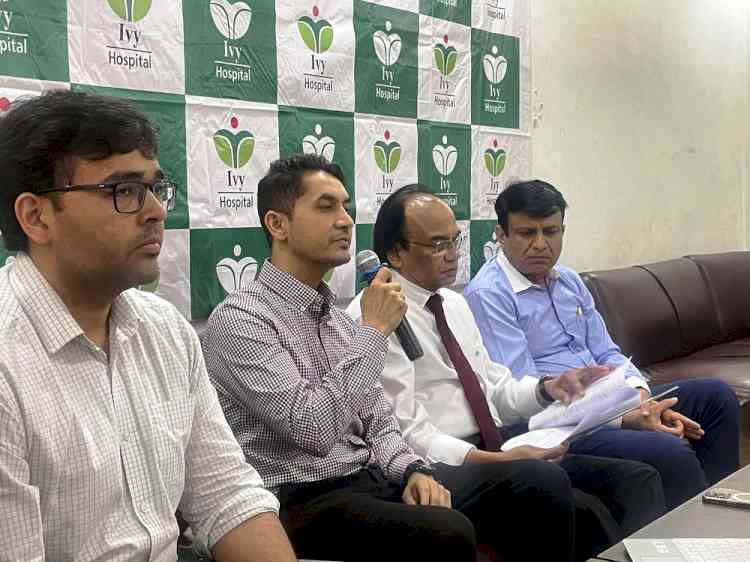Philips’ wake up call to Ludhiana on sleep disorders

Ludhiana, September 28, 2012:Philips Electronics India Limited (PEIL) today called for greater awareness on common sleep disorders that affect an overwhelming estimate of 93% of Indians* and pose serious health hazards.
Punjab being one of the states witnessing a significant rise in the number of sleep disorders, Philips, together with Dr. Jagdeep Whig, ex- Vice Principal and Head of Pulmonary Medicine , DMCH, and currently associated with Apollo Hospital in Ludhiana, highlighted the causes, symptoms and treatments available for sleep disorders.
Lack of sleep not only impacts the overall quality and productivity of a person’s life but also leads to serious health issues such as increased risk of diabetes, weight gain, high blood pressure and irregular heartbeats among others. If left untreated, lack of sleep and snoring could signal a more serious condition such as Obstructive Sleep Apnea (OSA), a condition characterized by the repeated cessation of breathing during sleep and which can potentially lead to heart disease, worsen heart failure and in rare cases even trigger heart attacks.
“Sleep is not optional but critical to one’s health and we are encouraging people to cultivate better sleeping habits and live healthier lives,”saidBidur Dhaul, Senior Director, Home Health Care, Philips Healthcare India. “The consequences of not sleeping enough are well documented and cannot be disregarded. If you are experiencing poor sleep, a visit to the doctor for a diagnosis is essential because you could have Obstructive Sleep Apnea. The good news is that this problem is easy to address once you have taken the first step of consulting your doctor. ”
In India, sleep disorders represent a significant yet overlooked health problem. As a global leader in sleep-related solutions, Philips has been consistently working towards raising awareness of sleep disorders and providing sleep-related solutions in India through a holistic four-pronged approach. This involves creating awareness about sleep disorders, providing solution for diagnosis and therapy, offering the requisite education and training to the medical fraternity and finally, monitoring post-therapy patient progress.
As part of this drive, Philips has assisted many hospitals and clinics in Punjab in establishing more than 20 sleep labs. 5 of these sleep labs are in Ludhiana and include those at DMC, Apollo and Dr. Jagdeep Whig’s Asthma Care and Chest Disease centre, among others. In all, Philips has assisted in establishing 200 sleep labs in the country till date. These sleep labs also help physicians accurately diagnose sleep disorders, while Philips provides technology, facilities and training.
Highlighting the symptoms of sleep apnea, Dr. Whig said, “While excessive snoring is one of the most common symptoms of sleep apnea, there are several other symptoms that you need to watch out for. For example, gasping or choking during sleep, excessive sleepiness or fatigue during the day, morning headaches, frequent urination during the night, depression, irritability and poor concentration. Most people today, especially those with high-stress lifestyles, can relate to one or more of these symptoms. This speaks volumes about how big the issue really is in India.”
“Untreated sleep apnea along with its associated complications has the potential to become an epidemic, unless patients start recognizing the severity of the problem and proactively reach out to their physicians. We have seen the number of sleep apnea cases increase significantly over the past 2 years, which is rather alarming,” adds Dr Whig.“Fortunately today there are several treatment options available including Continuous Positive Airway Pressure to surgical options. The first step in the treatment, however, is a proper diagnosis of the condition through a comprehensive sleep study, which is only possible once patients become aware of the problem and reach out to their physicians.”
According to the results of the Philips Sleep Survey, conducted by The Nielsen Company, 93% Indians are sleep-deprived, getting less than the 8 hours of sleep they need every day. An astonishing 11% take leave from work because of lack of sleep. The survey was conducted among 5600 respondents in the age group of 35 to 65 years across 25 cities in urban India with a population of 5 lakh and upwards. The Survey also reveals that 58% feel that their work suffers from lack of adequate sleep while 11% actually fall asleep at work. 72% report waking up anywhere between 1-3 times during their sleep. A whopping 87% agree they are aware that lack of sleep affects their health.
The survey amplifies the need for education on OSA and other sleep disorders which are not taken seriously enough among the individuals suffering from them. 62 percent of those polled displayed high risk of OSA while 3.3 per cent were likely sufferers of OSA. The survey also uncovered a disturbing fact that 14 per cent of Indians exhibit pauses in their breathing at night, anywhere from one to more than three times per week. Pausing in breathing, like snoring, is an OSA indicator, corroborating this link; the survey found that the proportion of this high risk group increased further to 90 per cent in those suffering from hypertension and diabetes or hypertension and cardiovascular disease.
(After the press conference, City Air News spoke separately toBidur Dhaul, Senior Director, Home Health Care, Philips Healthcare India. Watch it in a video clip attached with this copy. Editor)

 cityairnews
cityairnews 
















